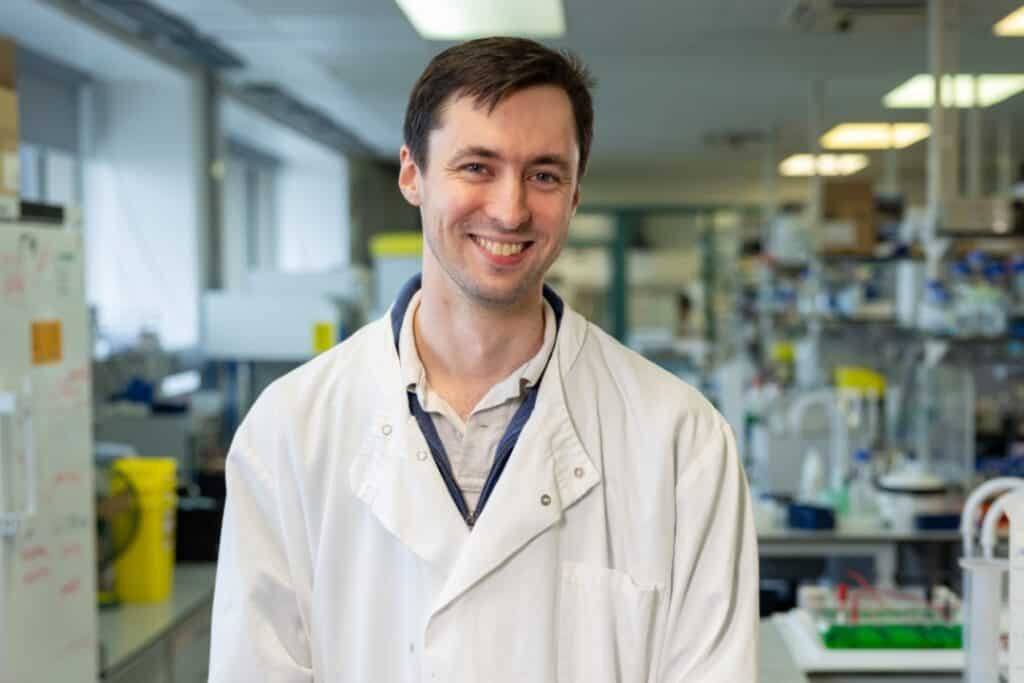King’s College London

Hearing loss affects over 18 million people in the UK for various reasons, including as a consequence of life-saving treatments like chemotherapy.
Postdoctoral Research Associate Dr James O’Sullivan was recently awarded an RNID Fellowship to investigate why hearing loss occurs in some chemo patients who are prescribed a particular medication. We caught up with James to find out more about his upcoming research.
Improving our understanding of how cisplatin damages hearing
Read about James’ workJames’ approach to hearing research
There is a drug called cisplatin that is prescribed to cancer patients who are undergoing chemotherapy. This drug is effective at destroying cancers because it attacks DNA in cells that are reproducing quickly, like cancer cells do. Unfortunately, it can also enter tissues in the ear, destroy the sensory structures, and cause hearing loss. What’s strange is not everyone experiences the same level of damage, and I hope to understand how differences in our genes might explain this variability, which could then help address cisplatin-induced hearing loss.
My project is specifically looking at structures within the cells called mitochondria. These structures have their own very special type of DNA, but sometimes the genetic code of this DNA can conflict with other genes in the cell’s DNA and cause health issues. I’m interested in how these conflicts affect how vulnerable the ear tissues are to cisplatin and its toxicity, and I’m going to be investigating whether DNA with this conflict increases the susceptibility of the inner ear to damage.
I think there’s still so much that we need to understand about the genetics behind why some people who receive this drug are susceptible to severe hearing loss, while others do not experience hearing loss at all.
We don’t really understand much about that variability, so I hope that my project will reveal a lot more information. In the long run, my hope is that patients who are receiving chemotherapy will be able to opt in to a genetic test so they can choose personalised treatment and retain their hearing.
The Fellowship will be the very first step in allowing me to lead a wider research programme, and it will help me secure further funding to investigate the genetics of hearing loss in more detail.
I believe that the project’s findings will one day be useful in clinical settings to help patients directly.
I originally chose to work in hearing research because the ear is a really interesting and intricate structure from a biological perspective. It’s exquisitely sensitive to things like ageing, so it’s a great system to look at alongside general principles that affect our health.
I’m also very interested in how metabolism can affect the inner ear – we don’t know much about this currently, but it takes a lot of energy for your ear to be able to hear.
I think it’s very underappreciated how isolating hearing loss and tinnitus can be. We are living in a society where healthcare and technology is improving, but this also means we are living longer in a noisier world.
Allowing people to continue communicating effectively with each other is something that’s going to be really important for building a strong society in the future.
It’s a massive honour and privilege to receive this funding. I’m very excited to be able to pursue my own research and spearhead an endeavour that I hope will ultimately make a difference to people who are at high risk of hearing loss.
I’m really hoping for two big breakthroughs:
A unified theory as to why hearing loss happens. We have several parts of the puzzle and understand how different structures within the cell play a role in hearing loss, but we need to make one big picture out of it
A good regenerative therapy that works in a clinical trial. This is difficult right now because we don’t quite understand enough about how the ear works and develops, but I really hope someone nails this down in the next few decades.